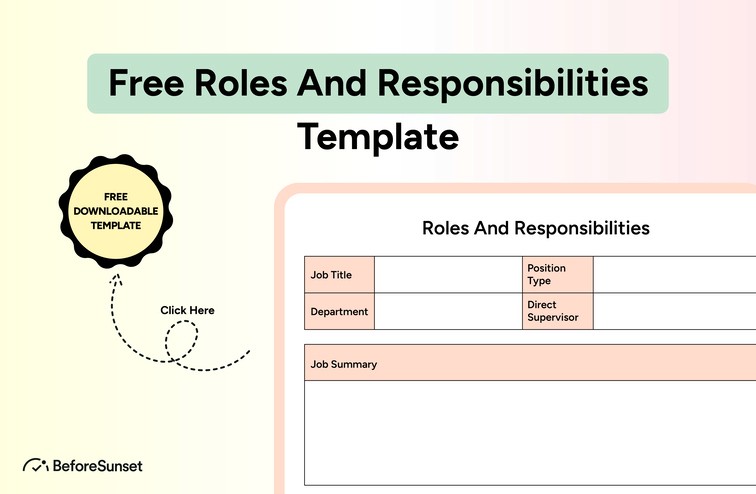A Roles and Responsibilities Template is a useful tool for companies looking for an organized and easily comprehensible way to outline and explain the expectations for every job in a team or project. With the help of this template's unambiguous structure, teams may define job descriptions, detailed duties, prerequisites, and KPIs at no additional expense.
This blog's versatility helps to minimize role ambiguity, encourage responsibility, and improve overall organizational effectiveness.
The Free Roles and Responsibilities Template is intended to provide an easy-to-use means for businesses to clearly define and communicate the fundamental components of each role, whether it be for project management, human resources, or any other type of cooperative effort. We'll go over each part of this template in the parts that follow, focusing on how useful it is for encouraging productive teamwork and communication.

Project Managers
Project managers are essential to the effective completion of tasks inside companies. Their role as coordinators of assignments, schedules, and groups is crucial in executing projects from start to finish.
Project managers are skilled in managing complexity, reducing risks, and making sure that every aspect of a project is in line with the organization's overall objectives. They are responsible for organizing, coordinating, communicating, and addressing problems; in other words, they are the glue that connects various project components together.
Project managers encourage teamwork and productivity in addition to keeping projects on schedule with their strategic thinking and sharp eye for detail. Project managers play a dynamic and demanding position that involves leading, facilitating, and catalyzing projects to successful ends in a corporate environment that is continuously changing.
Role of the Project Manager
Project Management: Developing a thorough project plan is the responsibility of project managers. Defining objectives, scope, finances, schedules, and necessary resources are all part of this. A carefully considered strategy lays the groundwork for a project's successful completion.
Team Leadership: Project managers are responsible for inspiring and leading their teams. To guarantee that every team member is aware of their responsibilities and makes a valuable contribution to the project's goals, they delegate work, offer direction, and cultivate a cooperative atmosphere.
Communication: Effective communication is essential to project management success. Project managers help team members, stakeholders, and other pertinent parties communicate with one another. They make certain that all parties are aware of the status, modifications, and possible hazards of the project.
Risk Management: One of the most important aspects of project management is identifying and reducing risks. Project managers prepare ahead, create backup plans, and try to reduce the negative effects of unanticipated difficulties on the project's budget and schedule.
Budget Management: Project managers are in charge of overseeing the finances for their projects. This includes keeping tabs on spending, distributing resources wisely, and making sure the project stays within budgetary limits.
Quality Control: Upholding the standard of outputs is of utmost importance. To guarantee that the project meets or beyond expectations, project managers set and enforce quality standards, carry out routine evaluations, and carry out corrective measures.
Timeline Management: Timeline management: It's critical to meet project deadlines. Realistic timeframes are made by project managers, who also keep an eye on developments and modify plans as necessary. They are skilled at striking a balance between efficiency and speed without sacrificing the caliber of the job.
Stakeholder Management: Project managers engage in stakeholder management by interacting with a range of parties, such as clients, executives, and team members. Establishing and preserving good connections with stakeholders is essential to the accomplishment of long-term organizational goals and the success of projects.
Adaptability: Plans seldom work out perfectly. Project managers must possess the flexibility to modify their plans in response to unanticipated difficulties, shifting priorities, or changing conditions.
Closure and Evaluation: Project managers supervise the closure procedure when a project is finished, making sure that all deliverables are fulfilled and stakeholder expectations are satisfied. In order to pinpoint areas for development and lessons learned, they also carry out post-project assessments.

Team Roles & Responsibilities
The roles and responsibilities of a team are essential components for any group or organization to operate effectively. Establishing and comprehending the roles and responsibilities that each person has in the complicated world of joint initiatives is essential to accomplishing group objectives.
While responsibilities give a clear framework for accountability and task ownership, roles in a team specify the precise duties and contributions that each team member is expected to make.
List of Team Roles & Responsibilities
1. Team Leader/Manager:
Responsibilities:
Provide overall direction and guidance to the team.
Make strategic decisions and set goals.
Facilitate communication and collaboration among team members.
Ensure the team stays on track to meet objectives.
2. Project Manager:
Responsibilities:
Develop and manage project plans.
Allocate resources and tasks.
Monitor project progress and address issues.
Ensure the project stays within scope, time, and budget.
3. Coordinator:
Responsibilities:
Facilitate communication between team members.
Schedule meetings and coordinate logistics.
Ensure information flows seamlessly within the team.
4. Facilitator:
Responsibilities:
Guide team meetings and discussions.
Encourage open communication and participation.
Ensure that meetings stay focused and productive.
5. Subject Matter Expert (SME):
Responsibilities:
Provide expertise and knowledge in a specific area.
Assist team members with technical or specialized information.
Contribute insights to decision-making processes.
6. Contributor/Team Member:
Responsibilities:
Complete assigned tasks and deliverables.
Collaborate with team members.
Participate in discussions and decision-making processes.
7. Communications Liaison:
Responsibilities:
Manage internal and external communications.
Ensure that team messages are clear and consistent.
Handle public relations and external stakeholder communication.
8. Quality Assurance/Control:
Responsibilities:
Ensure that work meets established quality standards.
Conduct quality checks and audits.
Implement corrective actions as needed.
9. Problem Solver:
Responsibilities:
Identify and analyze issues within the team.
Propose and implement solutions.
Collaborate with team members to address challenges.
10. Innovator/Creative Thinker:
Responsibilities:
Generate new ideas and approaches.
Encourage creative problem-solving.
Contribute to innovation within the team.
11. Timekeeper:
Responsibilities:
Monitor and manage timelines and deadlines.
Ensure that the team stays on schedule.
Coordinate with team members to address delays.
12. Note-Taker/Recorder:
Responsibilities:
Document meeting discussions and decisions.
Maintain records of project progress.
Provide a reference for team activities and outcomes.
13. Team Motivator:
Responsibilities:
Boost team morale and motivation.
Recognize and celebrate achievements.
Foster a positive and collaborative team culture.

Suitable Candidates for Each Position
Appointing qualified individuals to certain roles in an organization is a crucial responsibility that directly affects the performance of a team and the overall efficacy of the business. A distinct collection of abilities, credentials, and qualities is needed for each function in order to guarantee top performance.
It takes more than simply matching technical skills to identify qualified applicants; it also involves locating people whose beliefs mesh well with the organization's culture and who can improve team chemistry. Individuals in a variety of roles, from coordinators and subject matter experts to project managers and team leaders, are essential to the overall success of the team.
Skills and Qualifications Needed for Each Role
Team Leader/Manager:
An individual who is qualified for a role as a Team Leader or Manager has a proven track record of leading a team toward common goals. They have to have a track record of making wise decisions, devising plans of action, and cultivating a happy workplace. Strong communication abilities are necessary to inspire team members, properly communicate objectives, and promote cooperation.
Project Manager:
A seasoned expert with project management experience is the perfect project manager. Their exceptional planning and organizing abilities guarantee that projects are finished on schedule and under budget. An ideal applicant is able to make well-informed judgments, distribute resources efficiently, and approach problems with a solution-focused approach. Having effective communication skills is essential for managing activities and keeping stakeholders involved.
Coordinator:
A coordinator must possess extraordinary multitasking and organizing abilities. An ideal applicant is meticulous and has excellent time- and logistics-management skills. They should be skilled at promoting team collaboration and making sure information is shared effectively. Someone who can remain calm under duress and uphold team dynamics is necessary for effective coordination.
Facilitator:
A proficient facilitator is endowed with exceptional communication and moderating skills. They facilitate open communication and keep talks on topic and fruitful by facilitating team meetings and debates. A good fit is someone who can handle dispute diplomatically and knows how to use different facilitation strategies to encourage cooperation and productive communication.
Subject Matter Expert (SME):
A person with extensive expertise in a particular topic is known as a Subject Matter Expert. A qualified applicant is not just knowledgeable but also adept at explaining complicated concepts to a wide range of listeners. They keep abreast of market developments, offer insightful opinions to decision-making sessions, and lead the team with their specific knowledge.
Contributor/Team Member:
Those who are a good fit for team member positions have excellent cooperation and teamwork abilities. They have responsibility for doing work on time, keeping to deadlines, and contributing actively to debates. In order to accomplish shared objectives, team members must collaborate well and be adaptable.
Communications Liaison:
Effective writing and verbal communication abilities are essential for a Communications Liaison. Eligible applicants possess media and public relations expertise, guaranteeing their ability to efficiently handle both internal and external communications. Building relationships with stakeholders requires having strong relationship-building abilities.
Control and Quality Assurance:
A professional in Control and Quality Assurance must be meticulous and have excellent analytical and critical thinking abilities. To guarantee the highest quality of deliverables, suitable candidates comprehend and apply quality standards and procedures, conducting routine evaluations and putting corrective measures into place as needed.
Problem Solver:
People with excellent analytical and critical thinking abilities are a good fit for a problem solver position. They are skilled in locating and resolving the underlying reasons of problems within the group. Proactive and solution-focused team members work together with effective issue solvers to put solutions into practice.
Innovative/Creative Thinker:
An innovative or creative thinker demonstrates inventiveness, unconventional thinking, and a risk-taking attitude. Appropriate applicants bring new insights and viewpoints to the table, encouraging creativity among team members. Effective communication and teamwork are essential for exchanging and putting creative solutions into practice.
Timekeeper:
Someone with good organizational and time management abilities would be a good fit for the position of Timekeeper. They pay close attention to detail and have good timekeeping and deadline-management skills. Effective communication and teamwork are crucial for maintaining the team's timeliness.
Take-Note/Recorder:
An excellent Note-Taker/Recorder has good writing and documentation abilities and is meticulous. Appropriate candidates are those who can correctly record meeting decisions and conversations and who listen intently. Having good organizational abilities is essential for keeping track of project developments.
Team Motivator:
A team motivator is someone who possesses passion, empathy, and a positive outlook. Appropriate applicants are able to encourage and inspire others and comprehend team dynamics. Acknowledging and applauding successes helps to foster a cooperative and upbeat workplace atmosphere.
Get Yourself A Free Template With BeforeSunset AI
BeforeSunset AI gives you a free template, all you have to do is click on the cover image.

